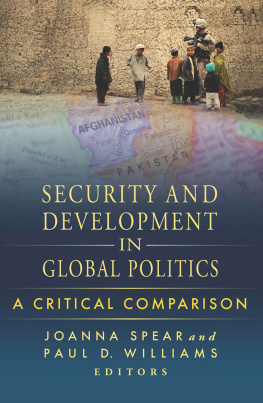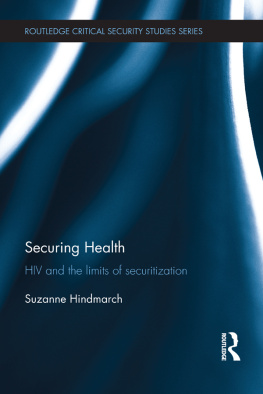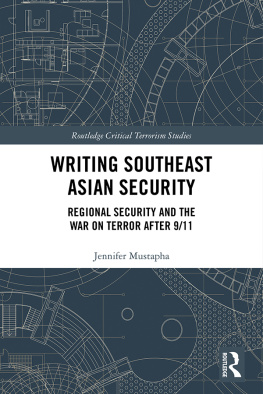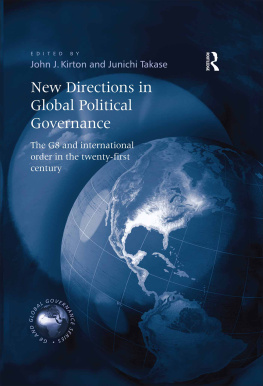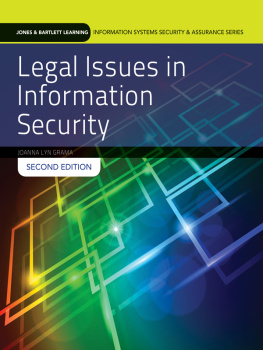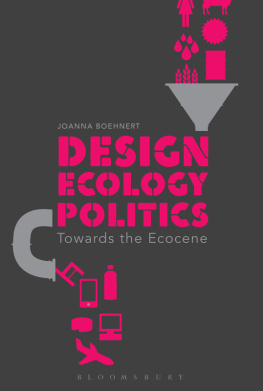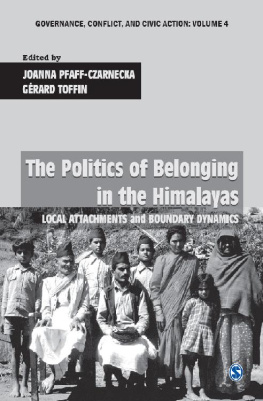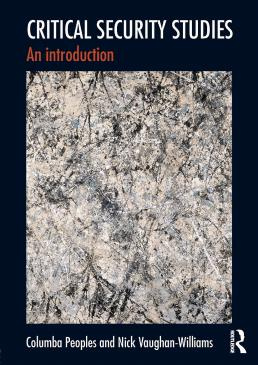Security and Development in Global Politics
Security and Development in Global Politics
A Critical Comparison
JOANNA SPEAR AND PAUL D. WILLIAMS, EDITORS
Georgetown University Press, Washington, D.C. www.press.georgetown.edu
2012 by Georgetown University Press. All rights reserved. No part of this book may be reproduced or utilized in any form or by any means, electronic or mechanical, including photocopying and recording, or by any information storage and retrieval system, without permission in writing from the publisher.
Library of Congress Cataloging-in-Publication Data
Security and development in global politics : a critical comparison / Joanna Spear and
Paul D. Williams, editors.
p. cm.
Includes bibliographical references and index.
ISBN 978-1-58901-886-0 (pbk. : alk. paper)
1. Security, International. 2. Economic development. I. Spear, Joanna, 1961 II. Williams, Paul, 1975
JZ5588.S42845 2012
338.9dc23
2011035690

This book is printed on acid-free paper meeting the requirements of the American National Standard for Permanence in Paper for Printed Library Materials.
19 18 17 16 15 14 13 12 9 8 7 6 5 4 3 2
First printing
Printed in the United States of America
This volume is dedicated to the memory of Dr. Caroline Thomas, author of the pioneering work on security and development, In Search of Security (1987).
Caroline was an initial contributor to our project but ill health prohibited her full participation and eventually stole her away from our discipline.
A great researcher, a clever and inspiring teacher, an incisive examiner, an administrator with sound political instincts and a penchant for cutting to the chase, she is much missed.
CONTENTS
Joanna Spear and Paul D. Williams
1 Conceptualizing the
SecurityDevelopment Relationship: An Overview of the Debate
Joanna Spear and Paul D. Williams
Bernard Harborne
Daniel Morrow
Joanna Spear and Paul D. Williams
Robert Maletta and Joanna Spear
Sabina Dewan
Joanna Spear and Paul D. Williams
Terrence Lyons
Alasdair Bowie
Joanna Spear and Paul D. Williams
George C. Fidas
Julie E. Fischer
Joanna Spear and Paul D. Williams
Paul D. Williams
Inder Sud
Joanna Spear and Paul D. Williams
Joanna Spear
Raymond Gilpin
Joanna Spear and Paul D. Williams
Jack A. Goldstone
Richard P. Cincotta
Joanna Spear and Paul D. Williams
Joanna Spear and Paul D. Williams
ACKNOWLEDGMENTS
We are particularly grateful to the Cumming family for providing the funding for this project on security and development. It is not often in life that anyone gets offered a sum of money to do something important and interesting, and we thank the Cumming family for giving us that opportunity.
We were lucky enoughthanks to the Cumming familyto be able to hold three workshops for this security and development project. These were terrific opportunities to bring together academics and practitioners. The first workshop, in October 2007, was a joint endeavor between the Elliott School at George Washington University and the British Economic and Social Research Councils New Security Challenges Program; we thank Stuart Croft for his collaboration to bring over some of the leading British thinkers on these issues. We would also like to thank Lee Ann Fujii for her critical review of the existing literature; this was a helpful springboard for all of our work. The second and third workshops were focused on the chapters for the book, and we would like to thank Beth Cole of the United States Institute of Peace, Karin von Hippel, and Sean Roberts of the International Development Program at the Elliott School for acting as discussants in the third workshop. We are also grateful to David Gow for his help in the early stages of this project.
During the long process from idea to finished volume, we have received valuable help from our program assistants. Dan Trapp helped with the first workshop, and Kaitlin Potter and John Townsend helped with the later two; John also assisted in reading draft chapters. We thank them all.
ILLUSTRATIONS
Figures
Tables
INTRODUCTION
Joanna Spear and Paul D. Williams
Security and development matter; they often involve issues of life and death, and they determine the allocation of truly staggering amounts of the worlds resources. Underdevelopment and insecurity are dominating the lives of billions of people. As we complete this book, approximately 1 billion people are undernourished, and roughly one in three human beings exist on less than two dollars a day. At the same time, more than seventy armed conflicts continue to rage, most of them in some of the worlds least developed countries.1
With statistics like these, it is not surprising that security and development have been so central to the theory and practice of international affairs. Concern is not only stimulated by a humanitarian interest in the fate of others; there are often strong motivations of self-interest at work, such as stopping civil wars before they spread their many problems beyond their countrys borders and preventing un-governed spaces from becoming havens for terrorism. In a more positive sense, however, underdevelopment abroad is also a missed opportunity for tradeand therefore further developmentat home. Despite these connections, the issue of how security and development relate to each other is a relatively recent preoccupation, one spurred by policymakers trying to deliver solutions to some of the worlds most wicked problems.2
Although currently attracting significant attention from policymakers and analysts alike, the relationship between security and development in global politics is still not well understood in either theory or practice. This book intends to improve that understanding by tracking the course of the debate so far and providing a comparative conversation between experts within the arenas of security and development. We do this by exploring a set of seven core international issues from the perspectives of experts in both security and development in order to assess the extent to which there really is a nexus between these two concepts, and, crucially, whether that nexus should be encouraged or resisted.
In the debate so far, claims about a nexus between the two arenas have revolved around issues relating to unconventional armed conflict (i.e., insurgencies), so-called failed states, andparticularly outside of the United Statesthe concept of human security. Even in these issue areas, where the links between security and development seem real and desirable, we are skeptical of the claims of an almost automatic nexus. This becomes more apparent if the relationship between the two arenas is considered across a wider set of issues than armed conflicts and counterinsurgency responses. The following chapters thus examine security and development perspectives on seven core issues: aid, humanitarian assistance, governance, health, poverty, trade and resources, and demography. We start by considering the core issues for which claims have regularly been made for a securitydevelopment nexus but then consider others where the relationship has received much less attention. By mapping the securitydevelopment relationships across a more comprehensive set of issues, the implications of combining the two arenas become clearer.

 This book is printed on acid-free paper meeting the requirements of the American National Standard for Permanence in Paper for Printed Library Materials.
This book is printed on acid-free paper meeting the requirements of the American National Standard for Permanence in Paper for Printed Library Materials.
